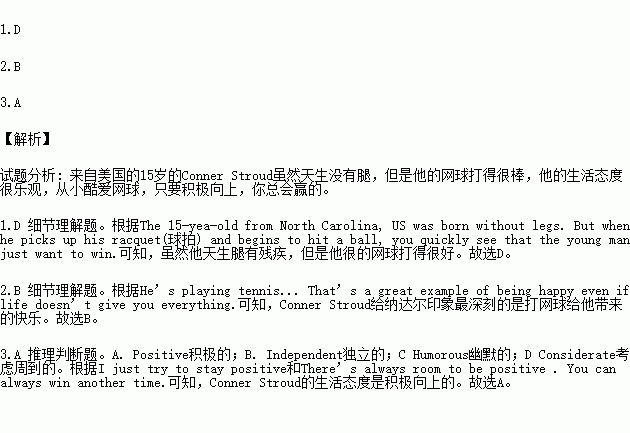题目内容
To get to the tennis court, Conner Stroud has to push his wheelchair there.
The 15-yea-old from North Carolina, US was born without legs. But when he picks up his racquet(球拍) and begins to hit a ball, you quickly see that the young man just want to win.
Stroud began playing tennis at age 5 at the small tennis club his parents own. For years, he played against able-bodied players by putting rubber on the stumps (残余部分) of his legs. Though he was a foot (30.48cm) or two shorter than many of the players he played against, he won a number of matches. He became well-known enough that he got to meet Rafael Nadal, his favorite player at the US Open in 2013.
“The most important thing is that he’s happy,” Nadal told reports about Stroud after that 15-minute meeting. “He’s playing tennis... That’s a great example of being happy even if life doesn’t give you everything.”
Stroud started playing wheelchair tennis at 13 and now he is No 1 in the US.
Earlier this summer, he played for the US in the world’s biggest junior wheelchair team tennis event --- the World Team Cup. He played six matches and won five of them as the US won the cup for the first time since 2000.
“He is a polite boy , but he will rip(撕扯)your heart out trying to beat you,” Jason Harnett, a United States Tennis Association coach, said of Stroud. “You see that attitude in a lot of the best players, whether they are able-bodied or disabled.
Teenage players can often get disappointed and angry. Racquets sometimes get thrown. Players shout at themselves after missed shots. Stroud never does that.
“ I just try to stay positive,” Stroud said. “After every point, I try to say I’m going to win the next point, or the next game, or the next game, or the whole match.
“ There’s always room to be positive . You can always win another time.”
1.How is Conner Stroud different from other tennis players?
A. He was disabled in a car accident.
B. He has been coached by his father since the age of 5.
C. He is too short to be a tennis player
D. He was born disabled , yet he plays tennis well.
2.What impressed Rafael Nadal the most about Conner Stroud?
A. His desire to win the match.
B. His happiness about playing tennis.
C. His faith in life, even though he is disabled.
D. The training he went through to play tennis.
3.Which of the following words best described Conner Stroud?
A. Positive B. Independent
C. Humorous D. Considerate

